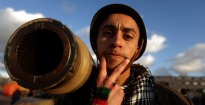Libyan Rebels Include Youth Fighters
 The New York Times reports:
The New York Times reports:
RAS LANUF, Libya — The bullet the boy held was bigger than his hand. He said he was 15, but then admitted he was 14, and frankly, he looked a year or two younger than that. When an enemy warplane approached, sending the gunmen around him scrambling for cover, the boy, with placid poise, stood and watched.
His friends called him the “smallest soldier.”
“I got here yesterday,” Ali Abdul Karim said Wednesday, after the threat of an airstrike had passed. He left home in Benghazi this week without telling his mother and hitched a ride south with some fighters. At a rebel checkpoint here — one of the most dangerous places in Libya — he sat on the porch of a mess hall and played in the dirt with his bullet, near boxes of ammunition and an antiaircraft gun.
As Ali watched, men with machine guns drove pickup trucks toward the battle with Col. Muammar el-Qaddafi’s troops. “I’m hoping to fight,” he said.
Dozens of Libyan teenagers traveled to Ras Lanuf this week, trying to help rebel fighters with their ultimately failed attempt to keep control of this oil town, a strategic prize. Among the doctors and former policemen who made eager volunteers and the stoic soldiers, the youngsters searched for Kalashnikovs and a way to get to the front lines.
This was no lark. In its opening moments, young men fueled the Libyan revolt, facing Colonel Qaddafi’s guns with stones from Tobruk to Tripoli. This week, with the revolution threatened and the rebels losing ground on two fronts, the young men said they felt needed again, even if there was really no way to help.
Like older brothers, adult fighters told boys to stay away from the front. Jomaah Attiya, 15, sat at the hospital in Ras Lanuf as a young medical student checked his pulse. The boy, woozy with a headache, had spent the day at the entrance to the city, with the fighters, after leaving his home near Benghazi without a weapon or a word to his family.
The medical student, Abdel Karim Talhi, had also come to fight, but said there was no way Jomaah was going forward.
The boy, who wore an olive drab sweater, had other ideas. “It’s not dangerous,” he said. “I’ll go if God says yes.”
Click here to read more.

